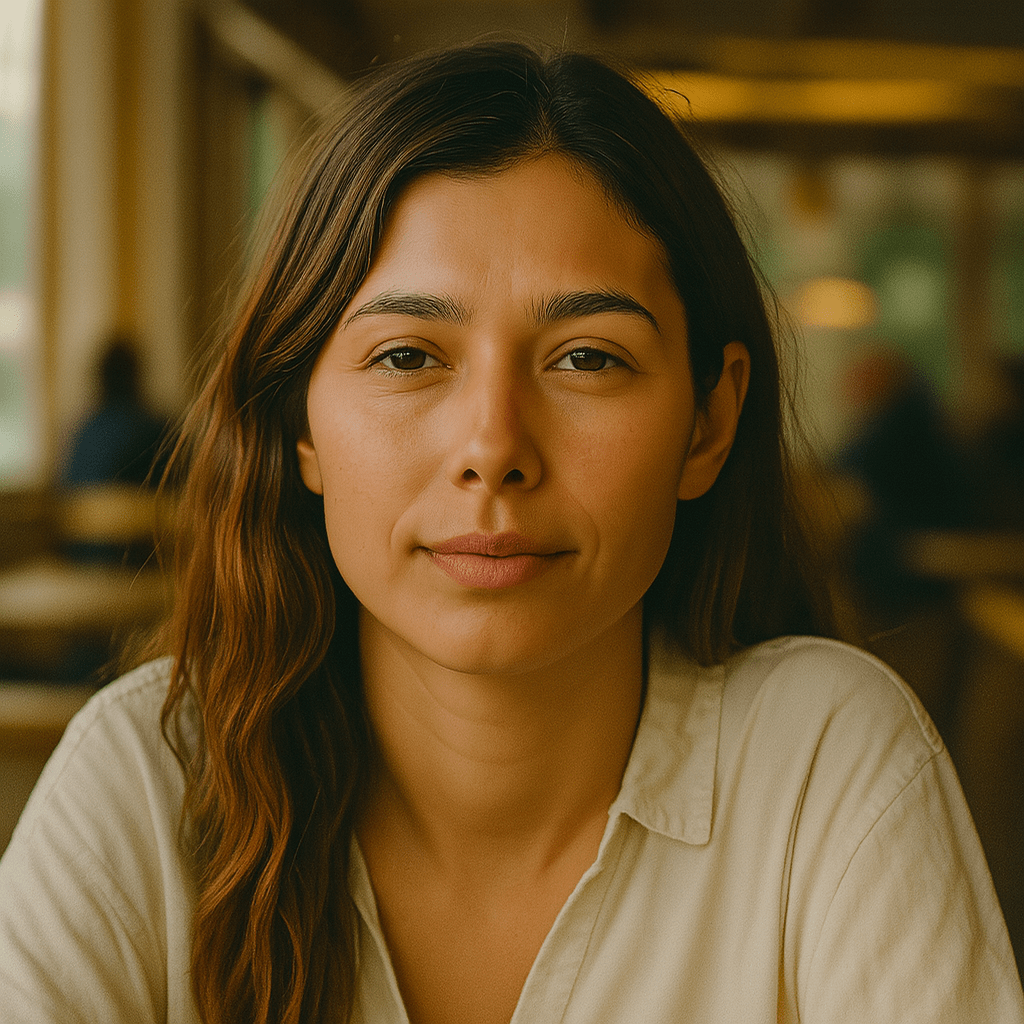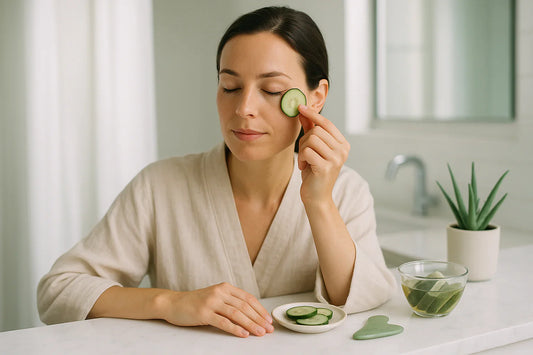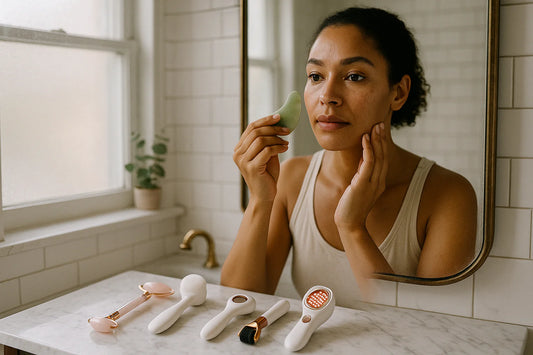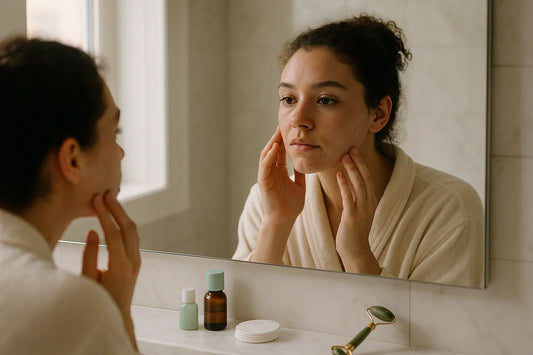Get your package anywhere!

Science-Backed Anti-Aging Skincare Routines That Actually Work
Did you know that 80% of visible aging is caused by environmental factors rather than genetics? While we can't stop time, research shows that the right anti-aging skincare routine can dramatically slow down and even reverse signs of aging. Whether you're starting prevention in your 20s or addressing existing concerns, science-backed ingredients and consistent routines deliver real, measurable results.
Table of Contents
- Understanding the Skin Aging Process
- Essential Anti-Aging Ingredients That Work
- Morning Anti-Aging Routine
- Evening Anti-Aging Routine
- Advanced Anti-Aging Treatments
- Lifestyle Factors for Youthful Skin
- Myths & Facts About Anti-Aging
- FAQ
Understanding the Skin Aging Process
Skin aging happens through two distinct pathways: intrinsic aging (natural genetic programming) and extrinsic aging (environmental damage). Understanding this process is crucial for choosing effective treatments.
Intrinsic aging begins in your mid-20s when collagen production decreases by about 1% per year. This leads to gradual loss of firmness, elasticity, and moisture. Extrinsic aging, primarily from UV exposure, accounts for up to 80% of visible facial aging signs.
Key changes include:
- Collagen breakdown: Leads to fine lines and wrinkles
- Elastin degradation: Causes sagging and loss of bounce
- Slower cell turnover: Results in dull, uneven skin tone
- Reduced hyaluronic acid: Decreases skin plumpness and hydration
"The most effective anti-aging approach combines prevention with treatment. Starting a science-based routine early and maintaining consistency is far more effective than trying to reverse decades of damage later."
| Type | Causes | Visible Signs |
|---|---|---|
| Intrinsic | Genetics, time | Fine lines, gradual sagging |
| Extrinsic | UV, pollution, lifestyle | Deep wrinkles, age spots |
| Hormonal | Menopause, stress | Dryness, thinning skin |
Essential Anti-Aging Ingredients That Work
Not all anti-aging ingredients are created equal. Clinical research has identified several powerhouse compounds that consistently deliver visible results when used correctly.
Retinoids remain the gold standard for anti-aging. These vitamin A derivatives accelerate cell turnover, stimulate collagen production, and fade hyperpigmentation. Start with lower concentrations to build tolerance.
Vitamin C is a potent antioxidant that brightens skin, protects against free radical damage, and supports collagen synthesis. L-ascorbic acid is most effective but can be irritating; magnesium ascorbyl phosphate offers gentler results.
Peptides are amino acid chains that signal skin cells to produce more collagen. Copper peptides and matrixyl peptides show particularly promising results in clinical studies.
Hyaluronic acid and niacinamide provide hydration and barrier support, while alpha hydroxy acids (AHAs) gently exfoliate to reveal smoother, more radiant skin.
Morning Anti-Aging Routine
Your morning skincare routine should focus on protection and preparation. The right sequence maximizes ingredient effectiveness while creating a perfect base for makeup.
Step 1: Gentle Cleansing
Use a mild, pH-balanced cleanser that removes overnight treatments without stripping natural oils. Avoid harsh scrubbing which can cause micro-tears.
Step 2: Antioxidant Serum
Apply vitamin C serum to damp skin for better absorption. This creates a protective shield against environmental damage throughout the day.
Step 3: Hydrating Treatment
Layer hyaluronic acid or peptide serums while skin is still moist. These ingredients work best when applied to slightly damp skin.
Step 4: Moisturizer
Choose formulas with ceramides, niacinamide, or antioxidants that support your skin barrier while providing all-day hydration.
Step 5: Broad-Spectrum SPF
Never skip sunscreen – it's your most important anti-aging step. Use at least SPF 30 and reapply every 2 hours.
| Step | Product Type | Wait Time |
|---|---|---|
| 1 | Gentle cleanser | Pat dry, don't wait |
| 2 | Vitamin C serum | 2-3 minutes |
| 3 | Hydrating serum | 1-2 minutes |
| 4 | Moisturizer | 2-3 minutes |
| 5 | SPF 30+ sunscreen | Ready for makeup |
Evening Anti-Aging Routine
Nighttime is when your skin enters repair mode, making it the perfect time for active treatments and intensive hydration. Your evening routine should focus on renewal and restoration.
Double Cleansing Method:
Start with an oil-based cleanser to dissolve makeup and sunscreen, followed by a water-based cleanser to remove impurities. This ensures completely clean skin for maximum product absorption.
Active Treatment Application:
This is when to use retinoids, AHA/BHA acids, or other potent ingredients. Start slowly – 2-3 times per week – and gradually increase frequency as your skin builds tolerance.
Intensive Moisturizing:
Night creams should be richer than day formulas. Look for ingredients like peptides, ceramides, and growth factors that support overnight repair processes.
Eye Area Care:
The delicate eye area needs special attention. Use eye creams with caffeine, peptides, or vitamin K to address puffiness, dark circles, and fine lines.
"I started using a high-frequency device along with my retinol routine six months ago. The combination has dramatically improved my skin texture and reduced my fine lines more than any single product ever did."
— Maria K., HighWand Customer
Advanced Anti-Aging Treatments
For enhanced results, consider incorporating advanced skincare technologies into your routine. High-frequency treatments use gentle electrical currents to stimulate collagen production and improve product absorption.
At-home devices like the HighWand Youth™ offer professional-grade results with the convenience of home use. These treatments can significantly boost the effectiveness of your topical products.
Weekly treatments such as enzyme masks, peptide treatments, or gentle chemical peels can accelerate skin renewal and enhance your daily routine results.
Professional consultations with dermatologists or aestheticians help customize treatments for your specific aging concerns and skin type.
Lifestyle Factors for Youthful Skin
Skincare products work best when supported by healthy lifestyle choices. Your daily habits significantly impact how well your skin ages and responds to treatments.
Nutrition for Skin Health:
Eat antioxidant-rich foods like berries, leafy greens, and fatty fish. Omega-3 fatty acids, vitamin E, and collagen-supporting nutrients provide building blocks for healthy skin.
Quality Sleep:
During deep sleep, your skin produces growth hormones that repair damage and generate new cells. Aim for 7-9 hours of consistent, quality sleep.
Stress Management:
Chronic stress increases cortisol levels, which breaks down collagen and impairs skin barrier function. Practice stress-reduction techniques like meditation, yoga, or regular exercise.
Hydration:
Proper hydration supports cellular function and helps maintain skin plumpness. Drink adequate water and use a humidifier in dry environments.
Myths & Facts About Anti-Aging
-
Myth: Expensive products always work better.
Fact: Ingredient quality and formulation matter more than price. Many affordable products contain effective anti-aging compounds. -
Myth: You only need anti-aging products after 40.
Fact: Prevention starting in your 20s and 30s is far more effective than trying to reverse damage later. -
Myth: Natural ingredients are always gentler.
Fact: Some natural ingredients can be more irritating than synthetic ones. Always patch test new products. -
Myth: More products mean better results.
Fact: A consistent, well-chosen routine with 4-6 products often works better than using dozens of products irregularly.
"The biggest mistake I see is people constantly switching products instead of giving proven ingredients time to work. Consistency with science-backed ingredients delivers better results than chasing every new trend."
FAQ
When should I start using anti-aging products?
Prevention is key – start incorporating gentle anti-aging ingredients like vitamin C and retinol in your mid-20s. Focus on sun protection and moisturizing from an early age.
How long does it take to see results from anti-aging skincare?
Most people notice initial improvements within 4-6 weeks, with significant results visible after 3-6 months of consistent use. Patience and consistency are essential for best results.
Can I use retinol and vitamin C together?
Yes, but not simultaneously. Use vitamin C in the morning and retinol at night to avoid potential irritation and maximize effectiveness of both ingredients.
What's the minimum effective anti-aging routine?
A basic routine includes: gentle cleanser, vitamin C serum (morning), retinol product (evening), moisturizer, and broad-spectrum SPF. This covers all essential anti-aging needs.
How do I know if my anti-aging routine is working?
Look for improved skin texture, reduced fine lines, more even tone, and enhanced radiance. Take progress photos monthly to track subtle changes that might not be immediately visible.
Building an effective anti-aging skincare routine requires understanding your skin's needs and consistently using proven ingredients. The combination of quality topical products, advanced treatments like HighWand Youth™, and healthy lifestyle choices creates the foundation for long-lasting, youthful skin. For more science-based skincare guidance, visit the American Academy of Dermatology or consult with a board-certified dermatologist.

More skincare tips
View all-

Natural Remedies to Minimize Puffiness Around t...
Over 70% of adults deal with eye puffiness, often making them look tired even after a full night’s sleep. Whether from allergies, habits, or genetics, natural remedies like cold therapy,...
Natural Remedies to Minimize Puffiness Around t...
Over 70% of adults deal with eye puffiness, often making them look tired even after a full night’s sleep. Whether from allergies, habits, or genetics, natural remedies like cold therapy,...
-

Choosing the Right Skincare Tool for Your Skin ...
Skincare tools in 2025 can be overwhelming—and 73% of beauty lovers admit they’re confused about what really works. The wrong pick can waste money and irritate skin, while the right...
Choosing the Right Skincare Tool for Your Skin ...
Skincare tools in 2025 can be overwhelming—and 73% of beauty lovers admit they’re confused about what really works. The wrong pick can waste money and irritate skin, while the right...
-

Why Does One Side of My Face Have More Acne? 7 ...
Asymmetrical acne—when one side of your face breaks out more than the other—affects most acne-prone people. Hidden triggers like sleep position, phone use, or hair products often fuel the imbalance....
Why Does One Side of My Face Have More Acne? 7 ...
Asymmetrical acne—when one side of your face breaks out more than the other—affects most acne-prone people. Hidden triggers like sleep position, phone use, or hair products often fuel the imbalance....
Satisfied or refunded
Free returns within 60 days
We are available 24/7
Contact us by chat, mail, phone
100% Secure payments
Visa, Mastercard, Amex, PayPal
We deliver worldwide
Get your package anywhere!
Satisfied or refunded
Free returns within 60 days
We are available 24/7
Contact us by chat, mail, phone
100% Secure payments
Visa, Mastercard, Amex, PayPal
- Choosing a selection results in a full page refresh.
- Opens in a new window.




